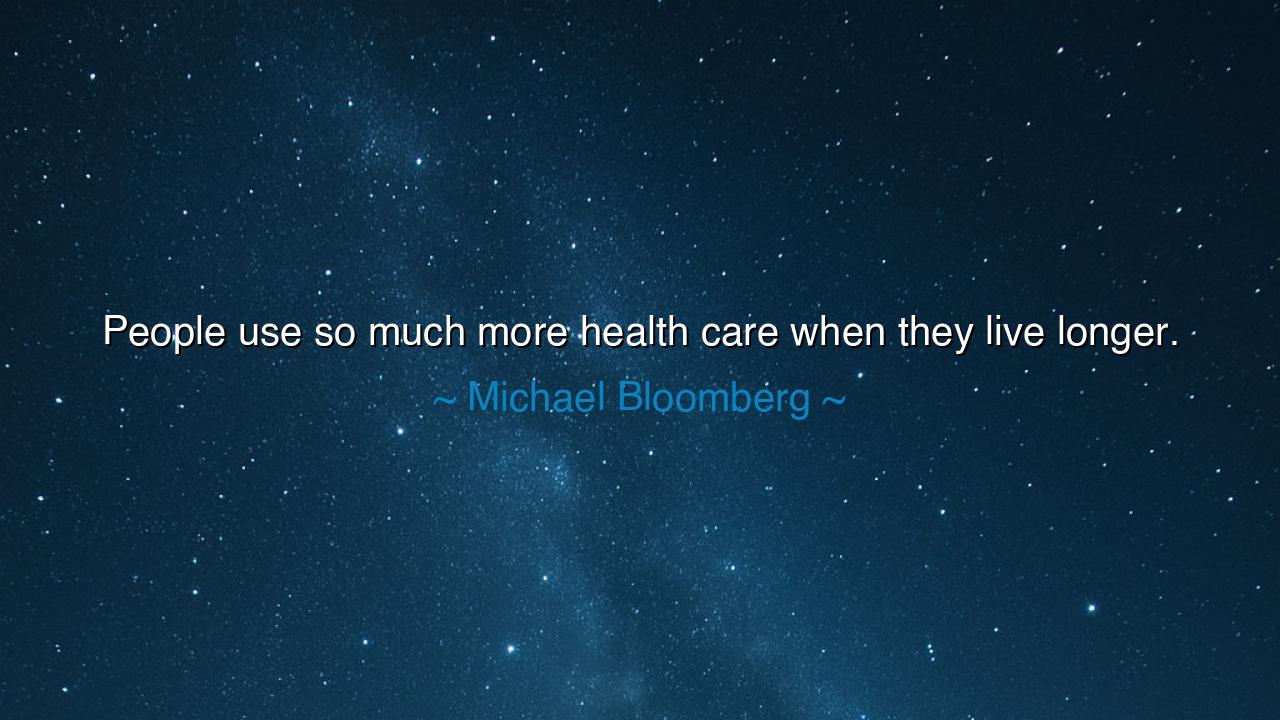
People use so much more health care when they live longer.






“People use so much more health care when they live longer.” Thus spoke Michael Bloomberg, a man of vision and pragmatism, who saw not only the promise of longevity but also the hidden burdens it brings. His words, though simple, reveal a profound truth about the cycle of life and the responsibility that comes with progress. For while humankind has mastered the art of extending life, it has yet to perfect the art of sustaining health. The blessing of longevity brings with it the challenge of care, and with every extra year of breath, society must reckon with how to nurture—not merely to prolong—the human spirit and body.
In ages past, life was short and uncertain. The ancients prayed for long years, seeing longevity as the greatest gift of the gods. But Bloomberg’s wisdom reminds us that long life, without foresight, can become a burden both to the individual and to the community. The elder who lives beyond his strength, the society that extends life without preserving vitality—these are signs not of progress, but of imbalance. True progress lies not only in adding years to life, but life to years. Thus, his words carry both admiration and warning: as we conquer death’s frontier, we must not neglect the foundations of well-being that make long life worth living.
Consider the story of Japan, a nation whose people live among the longest lives on Earth. Through diet, discipline, and community care, they have crafted a culture that honors longevity. Yet with this triumph comes the strain of an aging population—hospitals crowded, caretakers stretched thin, younger generations burdened by the care of elders. The miracle of long life, once a blessing, now demands new forms of compassion and innovation. This is the paradox of progress: that every victory brings new responsibility. Bloomberg’s quote stands as a call to wisdom—to prepare for the future not only with science, but with empathy.
There is a sacred rhythm to this truth. As people live longer, they depend more deeply upon the systems that sustain them—medicine, community, and love. To live long is not merely to exist, but to enter a new phase of interdependence. The ancients would have understood this as the circle of life’s reciprocity: the young once nurtured by their elders must one day become the nurturers. Yet in the modern age, this balance is strained. Families scatter, traditions fade, and care becomes a service instead of a bond. In this, Bloomberg’s words are both observation and warning—if we extend life, we must also extend compassion, preparation, and shared responsibility.
The deeper meaning of his statement is not to lament the cost of care, but to reawaken the conscience of society. For every added year of life is a triumph of civilization—proof of cleaner water, wiser medicine, and greater peace. But longevity without wellness becomes a hollow victory. What use is a long life if it is spent in suffering, disconnected from purpose or joy? The wise understand that health care is not simply the curing of disease, but the nurturing of wholeness. To live long in body must be matched by living deeply in spirit. Longevity must be matched by vitality.
The ancients spoke of this balance in their own way. In the writings of Confucius, the sage declared that the harmony of a nation depends upon the care of its elders. A society that honors its aged—feeding their bodies, respecting their wisdom—preserves its soul. Bloomberg’s quote carries the same moral charge for our time: as modern science grants us longer lives, our duty is not only to manage the costs but to uplift the quality of those years. For what is wealth or progress if it does not translate into dignity for the old and strength for the young?
Thus, the lesson is clear: longer life demands deeper wisdom. Each generation must plan not only for its birth, but for its aging. We must build systems of care that honor the humanity of those who depend upon them. We must invest not only in medicine, but in prevention, community, and mental health. Each person, too, must take up their share of this sacred duty—caring for their bodies through discipline, their minds through learning, and their hearts through kindness. For the health of the individual is the strength of the whole.
So, my child, remember Bloomberg’s insight: “People use so much more health care when they live longer.” It is not a complaint, but a reminder that every gift carries its price, and every blessing its burden. Let us therefore prepare wisely for the age of long life—by building not only hospitals, but communities; not only treatments, but habits; not only systems, but compassion. For in doing so, we honor the divine cycle of life itself, ensuring that the years we gain are years filled with meaning, purpose, and the quiet beauty of health well-earned.






AAdministratorAdministrator
Welcome, honored guests. Please leave a comment, we will respond soon